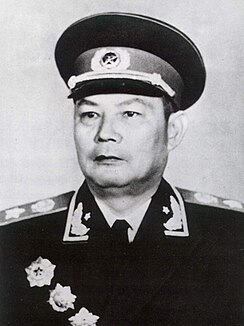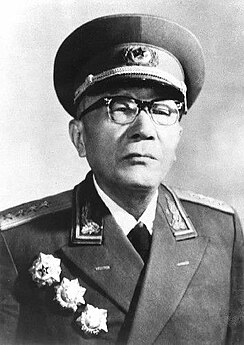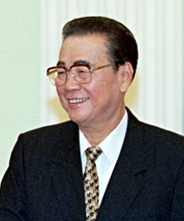Chronology
- 1st Plenary Session
- Date: September 12–13, 1982
- Location: Beijing
- Significance: Hu Yaobang was elected General Secretary, with Zhao Ziyang as his No. 2 (though he was listed fourth among top leaders). 28-member Politburo, 6-member Politburo Standing Committee and 5-member Secretariat were elected. The Central Advisory Commission was established. Deng Xiaoping was elected chairman of both the Central Military Commission and the Central Advisory Commission. In his closing speech, he talked about the retirement of elder leaders.

Beijing, alternatively romanized as Peking, is the capital of the People's Republic of China, the world's third most populous city proper, and most populous capital city. The city, located in northern China, is governed as a municipality under the direct administration of the central government with 16 urban, suburban, and rural districts. Beijing Municipality is surrounded by Hebei Province with the exception of neighboring Tianjin Municipality to the southeast; together, the three divisions form the Jingjinji metropolitan region and the national capital region of China.

Hu Yaobang was a high-ranking official of the People's Republic of China. He held the top office of the Communist Party of China from 1981 to 1987, first as Chairman from 1981 to 1982, then as General Secretary from 1982 to 1987. Hu joined the Chinese Communist Party in the 1930s, and rose to prominence as a comrade of Deng Xiaoping. During the Cultural Revolution (1966–1976), Hu was purged, recalled, and purged again by Mao Zedong.

The General Secretary of the Central Committee of the Communist Party of China is head of the Communist Party of China and the highest-ranking official within the People's Republic of China. The General Secretary is a standing member of the Politburo and head of the Secretariat. The officeholder is usually considered the "paramount leader" of China.
- 2nd Plenary Session
- Date: October 11–12, 1983
- Location: Beijing
- Significance: A Decision of the CPC Central Committee on the Rectification of Party Organizations was adopted in order to purge the Party from consequences of the Cultural Revolution. Around this time, the Anti-Spiritual Pollution Campaign was launched under Chen Yun's care. This was one of the few post-Mao meetings focused on ideological issues.

The Cultural Revolution, formally the Great Proletarian Cultural Revolution, was a sociopolitical movement in the People's Republic of China from 1966 until 1976. Launched by Mao Zedong, then Chairman of the Communist Party of China, its stated goal was to preserve Chinese Communism by purging remnants of capitalist and traditional elements from Chinese society, and to re-impose Mao Zedong Thought as the dominant ideology in the Party. The Revolution marked Mao's return to a position of power after the failures of his Great Leap Forward. The movement paralyzed China politically and damaged its economy and society, and killed an estimated 500,000 to 2,000,000 people. Mao's Great Leap Forward policies had already been the primary cause of a famine that resulted in approximately 30 Million deaths only 5 years earlier.
The Anti-Spiritual-Pollution Campaign was a political campaign spearheaded by conservative factions within the Communist Party of China that lasted from October 1983 to December 1983. In general, its advocates wanted to curb Western-inspired liberal ideas among the Chinese populace, a by-product of nascent economic reforms begun in 1978.

Chen Yun was one of the most influential leaders of the People's Republic of China during the 1980s and 1990s. He was also known as Liao Chenyun as he took his uncle's family name when he was adopted by him after his parents died. He was one of the major political leaders of China both during and after the Chinese Civil War along with Mao Zedong, Liu Shaoqi, Zhou Enlai, Zhu De and Ren Bishi and was later considered to be one of the Eight Elders of the Communist Party of China. In the 1980s and 1990s, Chen Yun was regarded as the second most powerful person in China after Deng Xiaoping.
- 3rd Plenary Session
- Date: October 20, 1984
- Location: Beijing
- Significance: A Decision of the CPC Central Committee on Economic Reform was adopted, fostering the new economic line pursued by Deng Xiaoping's leadership. A CPC National Conference on it was convened.
- 4th Plenary Session
- Date: September 16, 1985
- Location: Beijing
- Significance: Recommendations for the 7th Five-Year Plan were adopted to be submitted to the Party's National Conference on September 20, and then to the National People's Congress with the goal of adapting national economy to the reform. Party veterans Ye Jianying and Huang Kecheng retired.

The National People's Congress is the highest organ of state power and the national legislature of the People's Republic of China. With 2,980 members in 2018, it is the largest parliamentary body in the world. The National People's Congress meets in full session for roughly two weeks each year and votes on important pieces of legislation, and members are considered to be part-time legislators and are not paid to serve in the NPC.

Ye Jianying was a Chinese communist general, Marshal of the People's Liberation Army. As the chairman of the Standing Committee of the National People's Congress from 1978 to 1983, Ye was the head of state of China.

Huang Kecheng was a senior general (大将) in the People's Liberation Army.
- 5th Plenary Session
- Date: September 24, 1985
- Location: Beijing
- Significance: Meeting held after the September 20 National Conference. The leadership bodies of the Central Committee, the Central Advisory Commission and the Central Commission for Discipline Inspection were renewed. Li Peng entered the Politburo and the Secretariat.

The Central Commission for Discipline Inspection (CCDI) is the highest internal control institution of the Communist Party of China (CPC), tasked with enforcing internal rules and regulations and combating corruption and malfeasance in the Party. Since the vast majority of officials at all levels of government are also Communist Party members, the commission is in practice the top anti-corruption body in China.

Li Peng was a Chinese politician. Known as the "Butcher of Beijing" for his role in the Tiananmen Square massacre, Li served as the fourth Premier of the People's Republic of China from 1987 to 1998, and as the Chairman of the Standing Committee of the National People's Congress, China's top legislative body, from 1998 to 2003. For much of the 1990s Li was ranked second in the Communist Party of China (CPC) hierarchy behind then Party General Secretary Jiang Zemin. He retained his seat on the CPC Politburo Standing Committee until his retirement in 2002.
- 6th Plenary Session
- Date: September 28, 1986
- Location: Beijing
- Significance: A Resolution of the CPC Central Committee on the Building of the Socialist Spiritual Culture. The decision to convene the Party's 13th National Congress was taken.
- 7th Plenary Session
- Date: September 28, 1987
- Location: Beijing
- Significance: Preparations for the Party's 13th National Congress were made. A plan for administration reform was adopted. Hu Yaobang resigned as General Secretary, and Zhao Ziyang was appointed acting General Secretary.


